The art of having good taste and trusting yourself
A conversation with Bijan Shahvali, founder of intramural shop, about his Iranian roots, getting laid off, forcing him to go all in on intramural, curating good vintage in a crowded market, and more.
The special sauce
It’s hard to say what special sauce Bijan Shahvali has, but everything the LA-born, NYC-dwelling vintage specialist and creative consultant cooks up is incredible.
Bijan is the founder of intramural Shop, which has grown beyond a vintage store into a consultancy that helps brands with everything from creative concepts to sourcing archival pieces.
Below, Bijan caught up with our pal Danny Giacopelli, formerly of Courier Magazine and Monocle and now editorial director at Mailchimp.
Danny’s also the author of Desire Paths, a newsletter all about the insightful lives of fascinating people.
PS- thanks to my guy Chris Fenimore, once again, for the awesome photos to accompany these editorials. Appreciate you always man!
BIJAN, tell us about yourself.
So, I grew up on the westside of LA. My family was originally from Iran, and they moved to the US a few years before I was born. I had a pretty tight-knit family growing up. My aunts and their families all moved over from Iran at the same time as my parents. We lived close to each other and saw each other all the time.
I’m a westside transplant. I can only imagine what it was like growing up here in southern California. Idyllic?
Yeah, tons of the things I appreciate now I totally took for granted back then, like being so close to the beach and having nice weather. I visit from New York a couple times a year now and definitely take advantage of it.
Were you interested in vintage when you were younger?
I was always into cultural things. At one point, I wanted to be a musician, but I couldn't figure out how to play instruments. So I just figured I'd be someone who made curated mixtapes for friends, putting things together and presenting them for people to enjoy.
That’s how I interacted with music without actually creating it. Which is sort of a parallel to what I’m doing now with vintage. But I never knew I wanted to be a vintage dealer. I didn't know that was even a career.
Your family was in the clothing trade, right?
My dad worked in apparel my whole life. He and my uncle had a brand. They sold a lot of workwear and denim—nothing too fashiony. That was the start of my interest in clothes as a business.
But there was also the component of being in school and seeing how everyone dresses—how people from this neighborhood or that culture—skate, punk—are wearing something.
Almost an anthropological perspective.
Totally.
When we’re young, we're trying to find ourselves and people similar to us. One way of doing that is what you wear. I was experimenting with stuff, picking up on things I thought looked cool. Honestly, I remember having moments where I was like, I really hope someone asks me what this t-shirt is, just so I can talk about it.
It’s all about the context.
It adds something intangible. And twenty years later, that's still the case. I mean, your whole life is that – you’re signaling. That's why the anthropological and sociological layer is so important – especially when you’re sourcing vintage.
At least, that's my approach.
What’s going to have significance? What’s going to resonate with people beyond That looks sick… cool shade of blue… it matches my shoes. There’s gotta be a deeper level beyond the strictly aesthetical. That extra layer of appreciation makes the difference.
So what did you do in your life and career between then and intramural?
Where I'm at is a culmination of many points in my life. In college, I studied sociology. I became really interested in the many ways you can learn about someone. One way is by observing the stuff they have, the stuff they wear, and how they wear it.
I also interned at Freshjive, one of the iconic 80s and 90s southern California streetwear brands alongside Stussy. That was a very cool experience, but for whatever reason, I didn't pursue it. I think I was scared of what it takes to work your way up in that industry, or I didn't think I was good enough.
After college I did many jobs trying to find myself, including working as the US sales manager for a tea company. A lot of that job was explaining the different teas, where they come from, how to brew it. Tea means a very specific thing to Americans. It's either iced tea or, like, Lipton's. But it's such a vast world. So there was a lot of storytelling involved. And if you look at my job now, it’s storytelling too.
There are some items I can sell and people know exactly what it is. But others, like a mug from the first production of some TV show… that needs a story.
Did you always know you wanted to launch your own thing?
All the people I admired, like my dad and uncle, were entrepreneurs. They forged their own path. That was very normal to me. That's just what you did. Maybe it’s an immigrant thing.
I had the idea for intramural for about two years before I actually launched it. I’d been collecting objects and clothing and searching for things my entire life. I just found a niche I thought I could position myself in. But I was complacent because I had a job. I though, Whatever, I'm busy. But it was really an excuse. Maybe I didn't have the confidence. Or I wasn't ready.
But then I lost my job…
You got pushed off the cliff.
I was like, well, if I'm going to do it, now is the time. It was pretty scary.
It's an incredibly scary thing to rely entirely on your own talent and skills to feed and clothe and shelter yourself.
Oh yeah. And intramural was definitely not bringing in enough to sustain itself for a while. Another fear was, Will people think I have bad taste? Because it's so personal to my taste. I was really putting myself out there.
It's not just a business, it's me. Or a slice of me. You know what I'm saying?
Totally.
That bit is scary. I couldn't tell you how I got over it. I just did it.
I guess you build confidence over time. What market gap did you think you could position yourself into?
I would always see vintage sellers I liked that had a certain nostalgia – their pieces tied into subcultural elements or were relics of something else; not just a piece of clothing. And so I thought wouldn’t it also be interesting if you channel that and do it with objects and home goods, too?
If you're already buying the clothing, you could also buy these objects and continue surrounding yourself with things that inspire you. When you go on Instagram, everyone’s selling vintage.
So, this helped me differentiate myself pretty quickly. An easy way of cutting through. One challenge was that a lot of my customers live in New York with really small apartments and not a lot of space!
If your customers trust your eye, they might follow you into whatever new niche you get into. I always find businesses built around a single person’s taste super interesting.
It’s still crazy to me that people think I have good taste. It's very fun and rewarding when people feel the same way as me about these random things I find. They feel the same excitement that I feel.
Where do you turn to for inspiration?
Honestly, it comes from just experiencing life and culture. People sometimes ask, Where do you source this stuff from? And, honestly, I think that's almost the easy part! I could show you where you can find this shirt. I could tell you I got it at Rose Bowl.
But that doesn't really mean anything to you or help you, per see.
The much better advice is to skate when you're younger. Go to shows. Watch movies. Be a nerd and research stuff. Go outside and see what people are into. Have great conversations.
Be open to culture and appreciate it. Be hungry for more.
Be curious.
Yeah, I'm trying to exist as a sponge and be open to anything. That's what's so cool about vintage. It's always changing. I'm probably going to be into some completely new shit in five years.
Do you think vintage has become too crowded, saturated, or competitive?
Yeah, for sure.
But the only thing you can do is just source and sell the stuff you think is cool. When you start to do what everyone else is doing, you'll get lost. Again, the only way to cut through is to be yourself and be consistent.
Keep your voice. Treat your vintage like it's your brand. Sourcing stuff is like your version of designing a new product. You're obviously not designing, but when you take a step back and look at it, it should be put together in a cohesive way.
Speaking of designing your own stuff, there are vintage brands that do that. I think of BRUT in Paris. How do you feel about going from curating to creating? Is it wearing a totally different hat?
Maybe it's the same hat, but turned around. You know what I'm saying? I think it's cool. If you found something that's really special and you want to recreate it and put your own spin on it, I think that's great.
It’s like: this was a thing in the past that I want to take into the current day and make my own, while also staying true to it. You're in the business of appreciating and respecting past designs.
What do you want to create?
There’s a joy in finding something that is discarded – something society forgot about, a design no one even remembers. And if it's cool, I want as many people as possible to feel it, see it, experience it.
So there’s creativity involved in building on that to make something new. That's what I see as the next phase of intramural – having a dual track of vintage stuff you know and love, and then new clothing and objects that are inspired by and reference those things.
Do you have a specific plan of what you want to be doing in 5, 10 years? Or are you, like most of us, just making it up as you go along?
I feel like I'm winging it! But I think in 10 years I’d like to be channelling my experience sourcing old things into a career that creates new ideas around products and experiences – perhaps in a design or strategy capacity. You gotta keep it interesting for yourself and continue the growth.
In our AI overlord future, a human's judgment and taste might be THE most valuable thing years from now. Someone who says ‘This thing is interesting’. And not because an algorithm says so.
Yeah, I'm banking on that. If that's not the case, I'm screwed!
Rapid fire — Bijan’s favorites:
Restaurant or cafe: Chez Ma Tante or Bernie's
Shop: Alive Herbals Grocery Store on Nostrand Ave
Book: Open by Andre Agassi
Film: The Big Lebowski
Musician/album: Currently Bar Italia
Holiday destination: Paris
Brands & products on rotation:
Uniqlo socks
Prince tennis shorts
Doc Martens 1461s
Levi's 505s
Stussy Shearling Reversible Bomber
Olivia Irja Beanie
Navy Friend Editions Hat
Mountain Hardwear Phantom Down Jacket




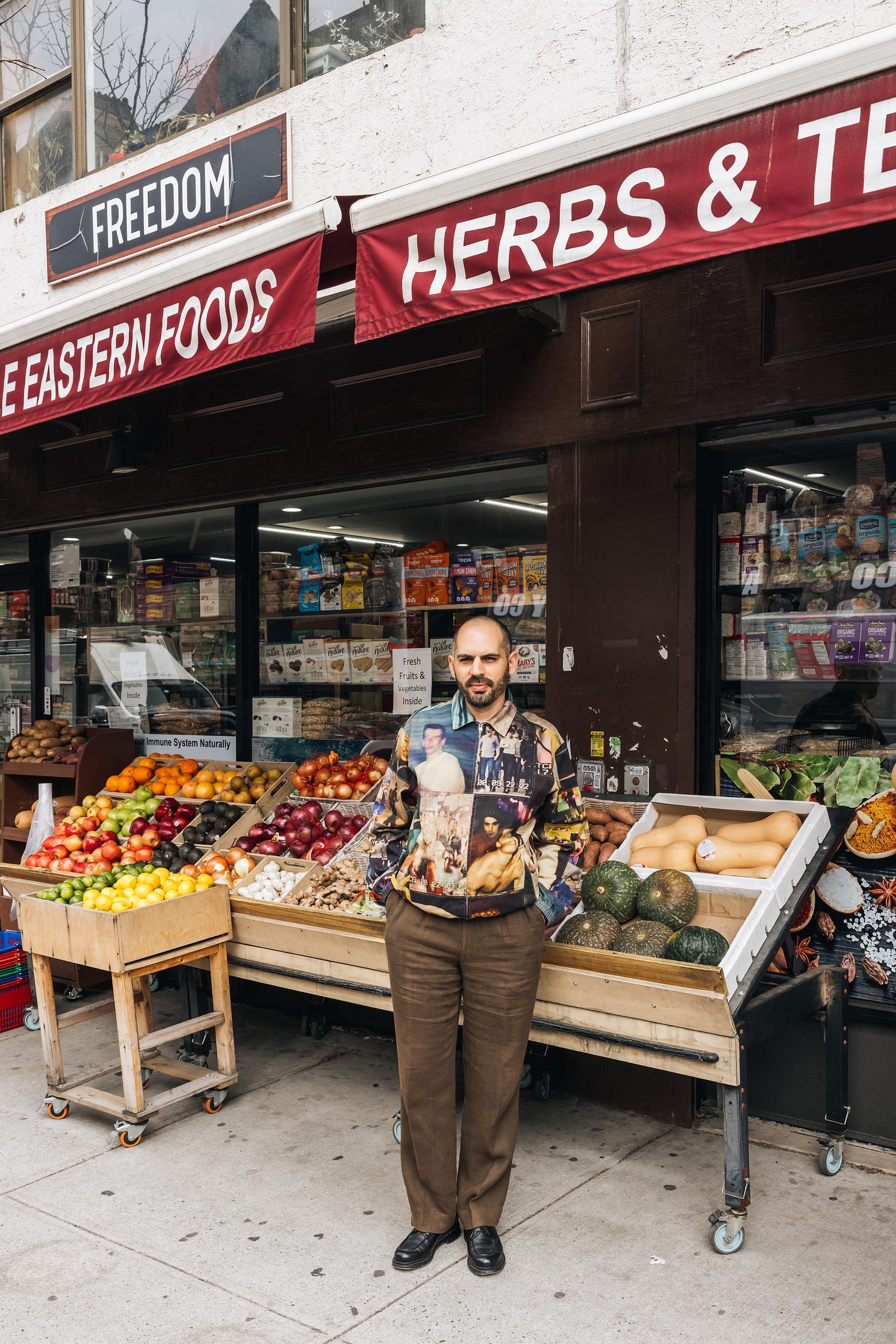
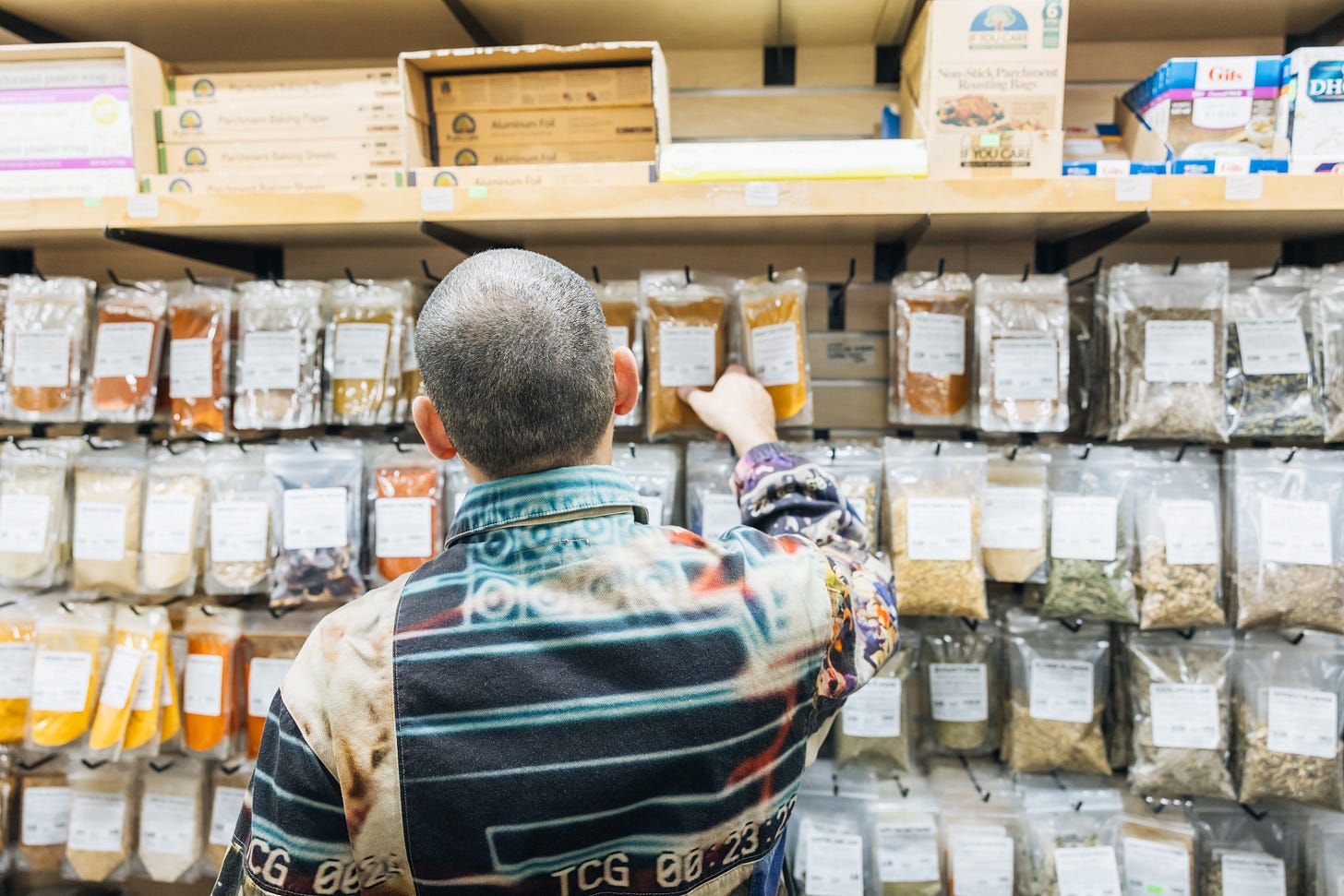


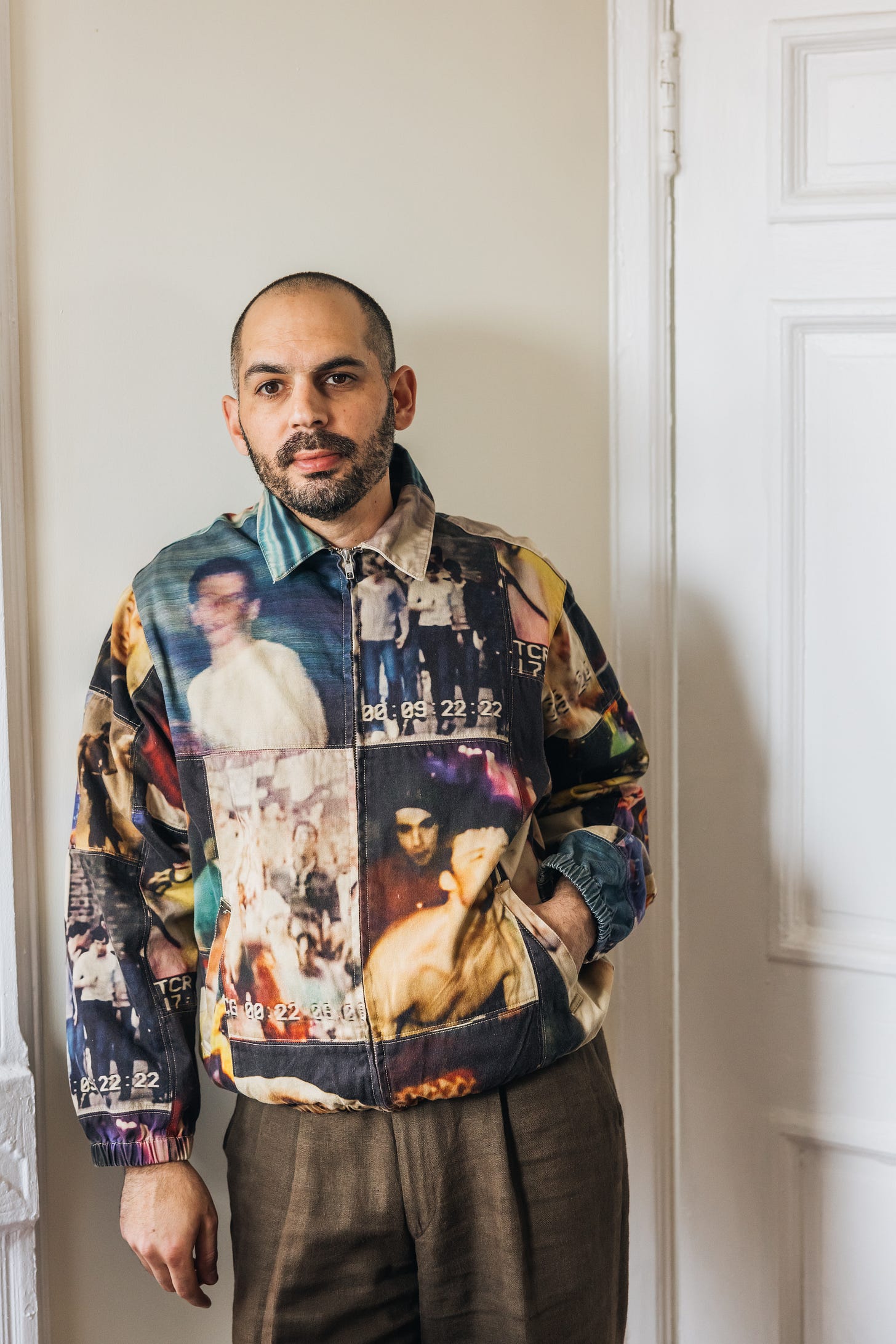
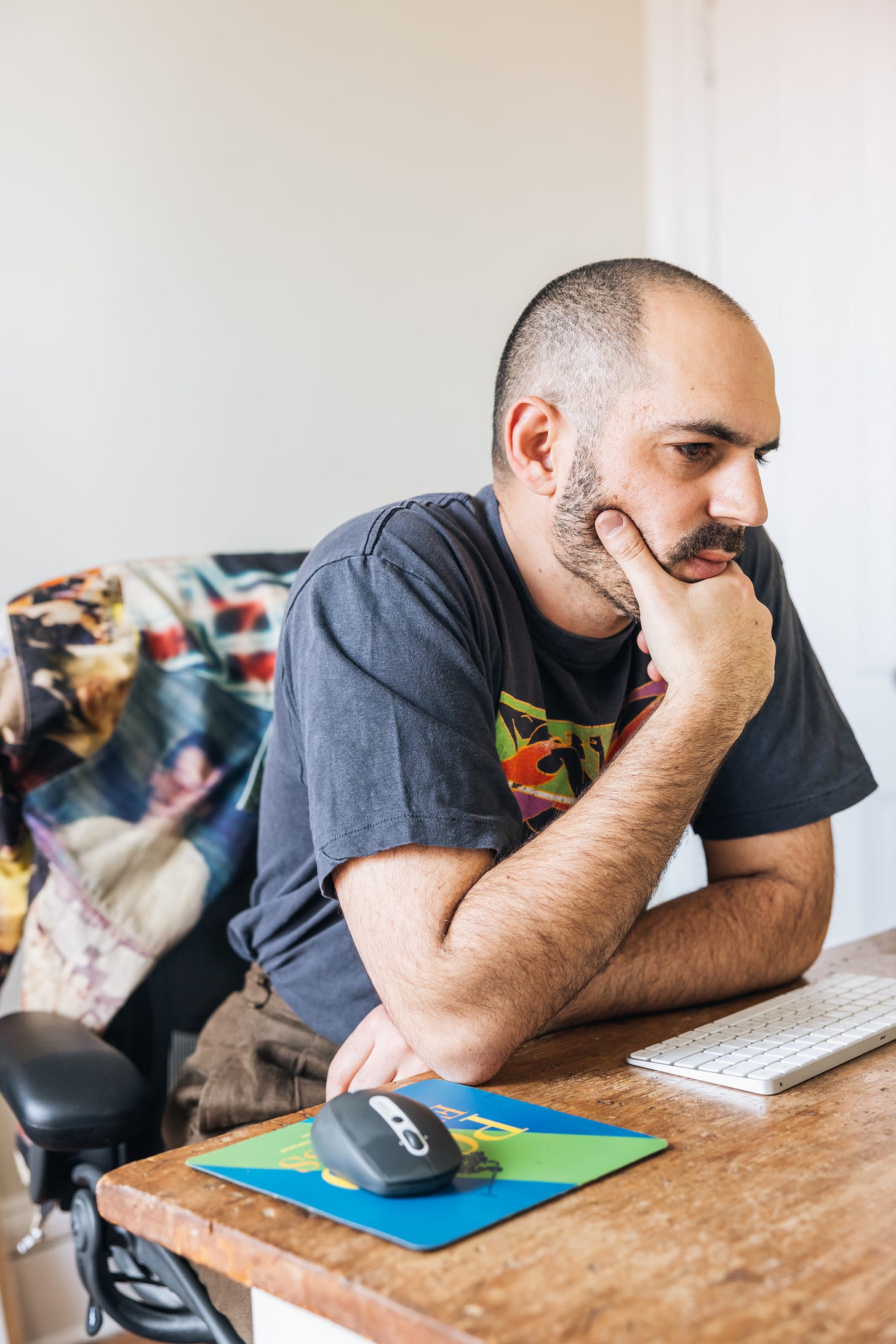


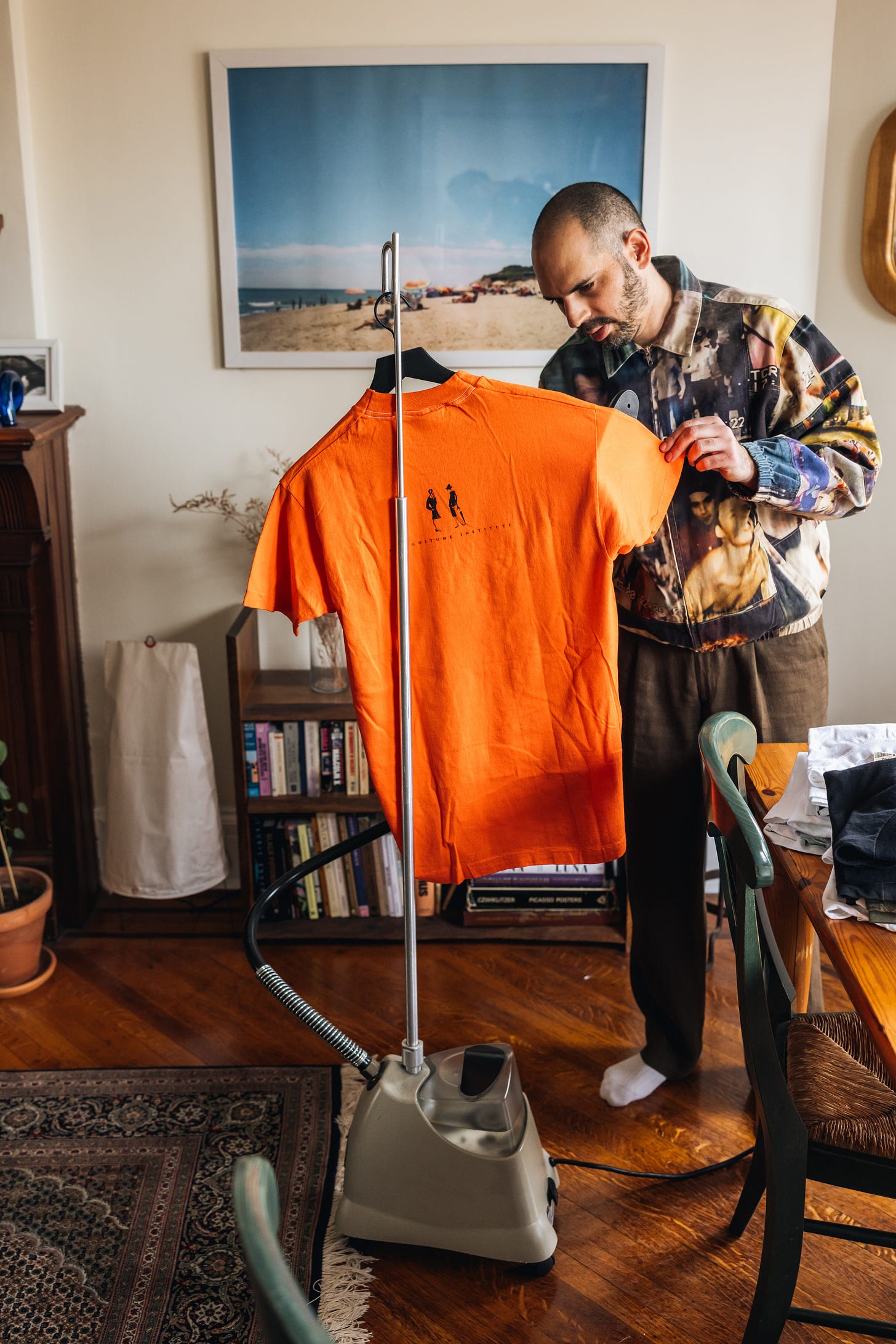

I absolutely love this message about trusting yourself, good editorial content like yours is rare these days!